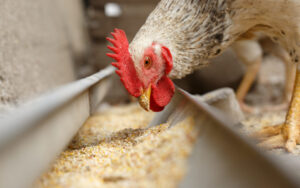Efficient poultry feed is crucial for the profitability and overall health of a poultry farm. Providing your birds with the right balance of nutrients, while optimizing feed costs, is key to improving productivity, growth rates, and egg production. However, simply offering a generic feed is not always enough. To improve feed efficiency, several factors need to be considered, from the quality of ingredients to feeding practices. Here’s a comprehensive guide on how to improve the efficiency of your poultry feed.

- Choose the Right Ingredients
The quality of the raw materials in your poultry feed directly impacts its nutritional value and feed conversion rate. By carefully selecting the right feed ingredients, you can significantly improve the efficiency of your poultry feed.
- Protein Sources: Ensure a high-quality protein source in the feed, such as soybean meal, canola meal, or fish meal. These protein-rich ingredients are essential for growth, feather development, and overall health.
- Energy Sources: Grains like maize, wheat, and barley are excellent sources of carbohydrates, providing energy for birds. The right balance of energy helps poultry maintain optimal health and productivity.
- Vitamins and Minerals: Ensure that the feed is supplemented with essential vitamins and minerals, like Vitamin A, D3, calcium, phosphorus, and trace elements. These support bone development, immune health, and reproductive performance.
- Optimize Feed Formulation
Feed formulation plays a vital role in improving feed efficiency. Working with a poultry nutritionist to develop a customized feed blend that meets the specific needs of your flock can maximize their growth while minimizing wastage.
- Adjust for Growth Stages: Poultry feed requirements change as birds grow. Ensure that you are providing the right type of feed for each stage—starter, grower, and layer—each with the appropriate protein, energy, and nutrient content.
- Consider Additives and Enzymes: Including feed additives such as probiotics, enzymes, and amino acids can improve nutrient digestibility, leading to more efficient feed conversion.
- Optimize Protein Levels: Protein is essential for growth and development. However, excess protein can lead to higher feed costs and waste. Ensure that the protein level is balanced with the bird’s requirements at different stages of growth.
- Improve Feed Delivery Systems
How feed is delivered to your poultry can also impact its efficiency. Using the right feeding techniques can help reduce feed wastage and improve feed intake.
- Automated Feeders: Automated feeding systems ensure that feed is distributed evenly across the flock, reducing the risk of over- or under-feeding. These systems also prevent feed wastage.
- Proper Feed Storage: Store feed in a dry, cool place to prevent spoilage, mold, or contamination, which can lead to nutritional loss and reduced feed efficiency.
- Adjust Feeding Schedule: Provide smaller, more frequent feedings to prevent overconsumption and promote better digestion. Free-choice feeding (where birds have constant access to feed) may be more efficient, especially during peak growth periods.

Track Performance and Adjust Feed Strategies
To continuously improve feed efficiency, it’s essential to track the performance of your flock and adjust feed strategies accordingly.
- Monitor Growth and Feed Conversion Ratios (FCR): Keep a close eye on your birds’ growth and feed conversion ratios. If FCR is not optimal, it may indicate that the feed formula needs adjustment or that other factors are affecting feed consumption.
- Adjust for Health Issues: If birds are underperforming, investigate potential health problems or environmental factors that may be affecting feed efficiency. Work with a veterinarian to address any issues promptly. Visit our website www.promoisinternational.com
- Reduce Feed Waste
Feed waste is a major contributor to inefficiency and increased costs. To minimize waste:
- Proper Feeding Techniques: Ensure that the right amount of feed is provided, and adjust portion sizes based on the flock’s size and production level.
- Avoid Spillage: Ensure feeders are designed to prevent feed from spilling onto the ground, which can attract pests or become wasted.

Conclusion
Improving the efficiency of your poultry feed involves a comprehensive approach, from selecting the right ingredients and optimizing feed formulation to enhancing feeding systems and monitoring bird health. By taking these steps, you can improve feed conversion rates, reduce wastage, and promote better growth and productivity in your poultry flock. Additionally, regular monitoring and adjustments based on performance will help ensure that your feed remains efficient, cost-effective, and supportive of your farm’s long-term success.
We at Promois International are a leading manufacturer and supplier of feed supplements and additives across the globe having a presence in more than 70 countries of the world including Spain, Mexico, Romania, Thailand, Vietnam, Azerbaijan, Georgia, Bangladesh, Sri Lanka, Algeria, Ghana, Uganda, Turkey, Venezuela & others to name a few.
